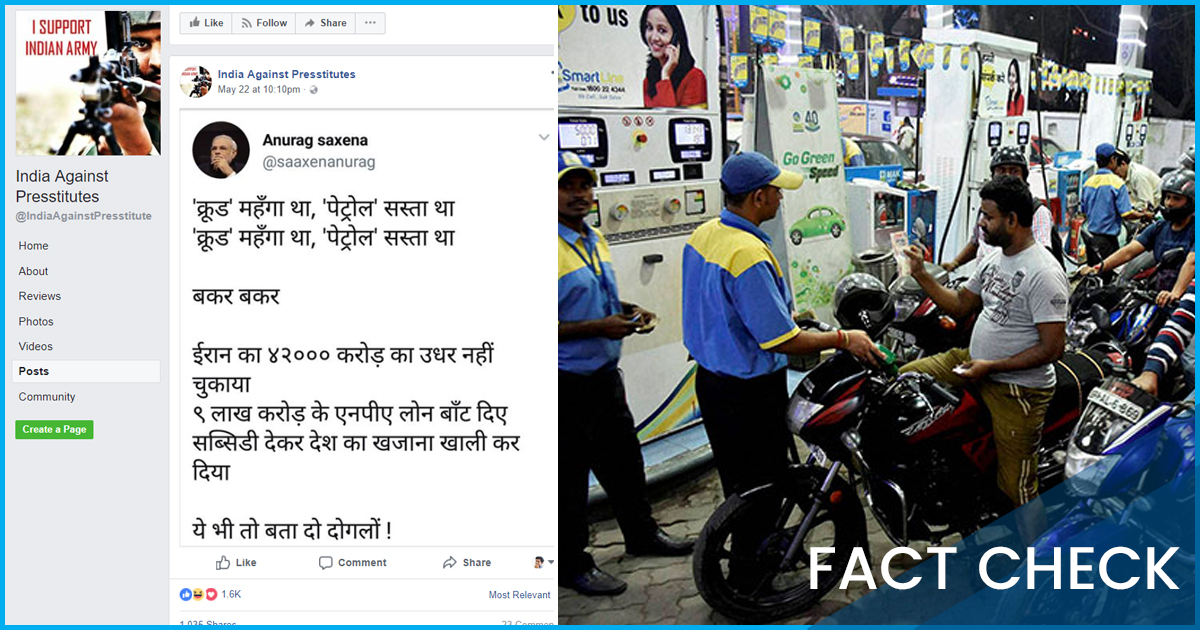
Fact-Check: Are Unpaid Dues To Iran, UPA Era Subsidies And NPAs Responsible For The Petrol/Diesel Price Rise?
28 May 2018 12:32 PM GMT
On May 27, prices of petrol and diesel were hiked for the 14th consecutive time in the last 14 days. There has been no real policy response from the government, except for hoping the international market would stabilise itself. On social media, posts and forward messages are spreading an image which is underplaying the importance of surge in fuel prices, and putting the blame elsewhere.
It’s time for a fact check.
Posted by India Against Presstitutes on Tuesday, May 22, 2018
Argument 1: India has unpaid dues to Iran amounting to Rs 42,000 crore
Reality: Actually, the correct figure is around 43,000 crore in unpaid dues to Iran for the period 2013-2016. This was due to the western sanctions on Iran for its atomic energy programme. Since early 2013, Indian companies were making part payment in rupees but the rest of the payment was blocked as per sanctions. These sanctions were only lifted partly in 2016, and then Indian companies started to clear the outstanding dues in instalments. PM Modi’s visit to Iran was beneficial to India-Iran relations but he went after the western sanctions were lifted.
RBI is coordinating these payments and said in 2016, “With sanctions blocking banking channels, Indian refiners have since February 2013 paid nearly half of the oil import bill in rupees while keeping the remainder pending opening of payment routes,” as reported by DNA.
Hence, the money was already allocated as payment in lieu of oil imports, only the actual transfer to Iran was delayed due to the international scenario.
People have started questioning the government and rightly so, as the prices of fuel over the last four years were kept on a higher level in the domestic market even though global crude oil prices were at a record-low. The depressed prices of global crude were the base of much of government’s populist plans and policies.
In an RTI filed by Chandrashekhar Gaur of Neemuch district in Madhya Pradesh, it was revealed that government’s earning from the indirect taxes on petroleum products was a whopping 2.67 lakh crore in the financial year 2016-17. In contrast, the revenue was only Rs 98,602 crore in FY 2012-13.
This is a matter of grave importance as higher fuel prices affect the whole nation. We import more than 80% of the fuel consumed in India. Inflation occurs as higher fuel cost to transport food and fertilizer is transferred to consumers. Our current account deficit rises, as our import bill rises with an increase in the price of petrol in the international markets. India’s foreign exchange reserves decrease as we have to pay for the fuel imports in dollars or euros. Overall, our food, fuel, and fertilizer subsidy bill also increase.
It is also important to note that ‘what-about-abc?’ and ‘what-about-xyz?’ doesn’t address the issue one bit.
Argument 2: UPA gave subsidies which bankrupted the nation
Reality: The role that subsidies play in creating sustainable development and growth is debatable. However, what is not debatable is the essential role of subsidies in preventing many from facing a subsistence crisis. It can also be a temporary way to assuage the aspirations of the lower classes and use them as vote banks.
A fact which has not escaped the NDA government, as in the latest budget, subsidy bill for the FY 2018-19 was increased by 15% to Rs 2.6 lakh crore.
Subsidy payments are dependent to a great extent on the price of fuel. Lower fuel price in international markets means lower subsidy bill by the government.
The bigger problem here is the deferring subsidy payments. A CAG report in December 2017 showed that total subsidies worth Rs 1,03,331.52 crore were not paid by the NDA government in 2016-2017. This included Rs 92,254.48 crore due to the Food Corporation of India (FCI), Rs 7,174.26 crore due to the petroleum sector, and Rs 3,902.78 crore due to the fertilizer sector.
FCI is the agency responsible for procuring food from India’s farmers. If the government doesn’t pay FCI on time, then FCI has to borrow money from banks to carry out its operations. The interest payments get added to the total subsidy bill.
These deferred payments are not taken into account while preparing the budget. Basically, the unpaid amounts are transferred on from one year to the next.
Argument 3: UPA government had given away 1 lakh crore in bad loans
Reality: This allegation is actually a modified one from the earlier batch of misinformation shared by propaganda groups on social media. The original was circulated on the official site of PM Modi, the NaMo app, and then propagated on social media by loyalists and ministers.


The discrepancies were noticeable from the RBI data given by Minister of State for Finance Shiv Pratap Shukla in response to a query in Rajya Sabha.

As told to Alt News in a written response, Ministry of Corporate Affairs Secretary Injeti Srinivas said, “I have been misquoted in the media on this matter. What I stated was that nearly 50% of the NPAs have got referred to the system put in place under IBC.”
Very soon, the official BJP twitter handle deleted that boastful tweet.
Creating or sharing fake news is never justified. We have a responsibility to verify everything that we post on the internet. To ensure that our national debate is healthy and well-informed, each and every one of us has a responsibility of treating what we read with a pinch of salt, a spoonful of doubt, and a flood of research.
 All section
All section













